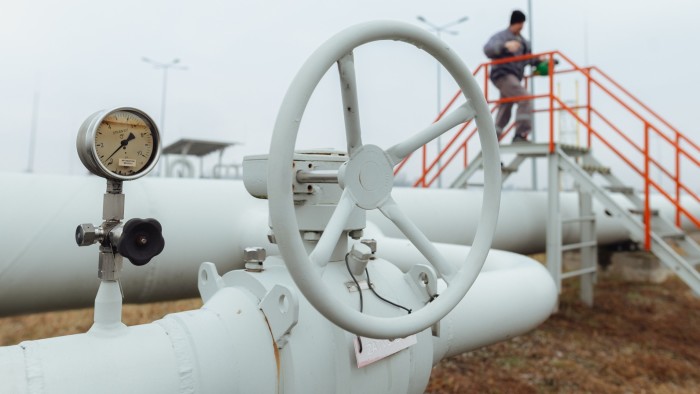Stay informed with free updates
Simply sign up to the EU energy myFT Digest — delivered directly to your inbox.
The European Commission plans to force EU companies to reveal details of their Russian gas contracts, as it seeks to crack down on fuel imports from the country by 2027.
Companies will be required to disclose the volume and duration of any gas contracts held with Russia to the EU executive, and to national energy and security authorities, under rules to be proposed next month, the commission said on Tuesday.
“These measures would give governments and the commission access to relevant information on Russian gas entering their energy systems, allowing the implementation of EU-wide targeted and effective measures and prepare alternative supplies,” the commission said.
The plan aims to help the EU phase out the last of Russian fuel in its system by 2027.
By the end of that year, the EU would be “completely free of Russian gas”, EU energy commissioner Dan Jørgensen said. “This is not a small thing, this is not without challenges but it can be done and we will deliver in a gradual and co-ordinated way,” he added.
Other measures include the prohibition of spot market contracts by the end of this year and long term contracts by the end of 2027.
The commission insisted that enough additional gas capacity would be coming online elsewhere in the world from next year to compensate for the loss of Russian fuel. The EU has said it would be willing to buy more US liquefied natural gas as a concession to President Donald Trump.
In order to legislate for the ban, Jørgensen said the EU executive had found a way for companies to invoke ‘force majeure’ clauses in their contracts that would not involve sanctions, which require unanimous approval from member states.
Hungary and Slovakia’s pro-Russian governments have regularly opposed gas sanctions, citing potential hikes in energy costs.
Slovakia’s deputy prime minister and minister of economy, Denisa Saková, said on Tuesday the country did not agree with the plan and that it was “fundamentally opposed to the European Commission preparing measures that damage not only our national interests and the purchasing power of Slovak households, but also the whole of Europe”.
Slovakia and Hungary are still heavily reliant on Russian fuels. Russian oil makes up about 80 per cent of supplies going to the two countries.
Russian gas makes up 13 per cent of the EU’s overall imports, despite efforts to sever dependence on Russian fuels since Moscow’s full-scale invasion of Ukraine in February 2022. Oil imports from Russia, which have been largely sanctioned, have dropped to about 3 per cent of the EU’s total supply. Before 2022, these were about 26 per cent.
A gas industry executive said that the commission’s document was “more ambitious” than expected. While the overall plan seemed positive, the executive questioned the legal basis for banning spot or long-term gas contracts.
Andreas Guth, secretary-general of industry body Eurogas, said gas companies “will of course comply”.
The commission has also proposed trade measures on imports of enriched uranium, such as tariffs or levies, and increased efforts to crackdown on Russia’s shadow fleet of oil tankers.
It said it would push member states to phase out supplies of Russian nuclear fuel, fuel services and spare parts from Russia and replace them with “fully European” alternatives.
Nucleareurope, an industry body, said “efforts have already been made to reduce our dependence on Russian fuels and components” and called for “long term visibility and EU support” to build up supply chains in Europe.

